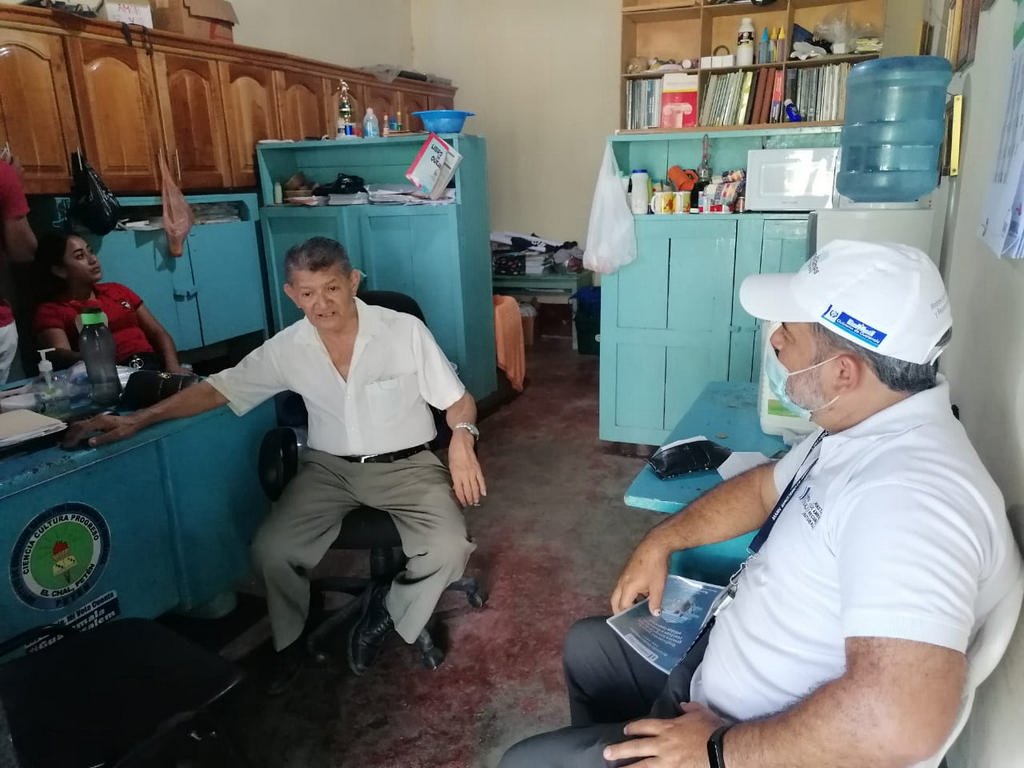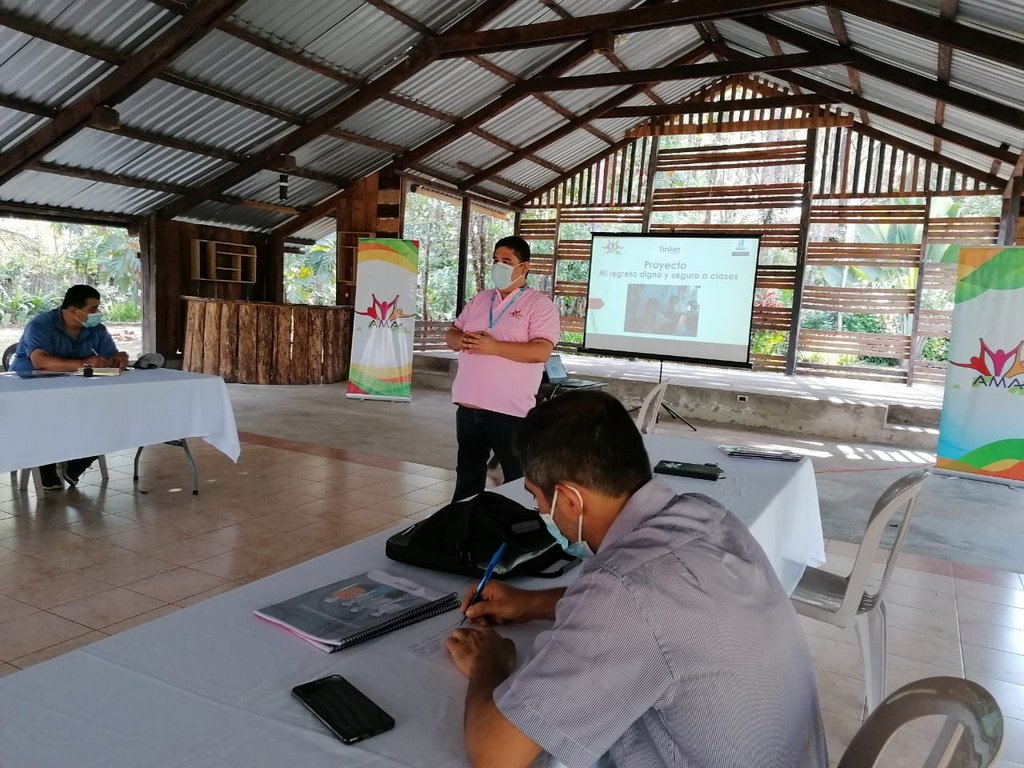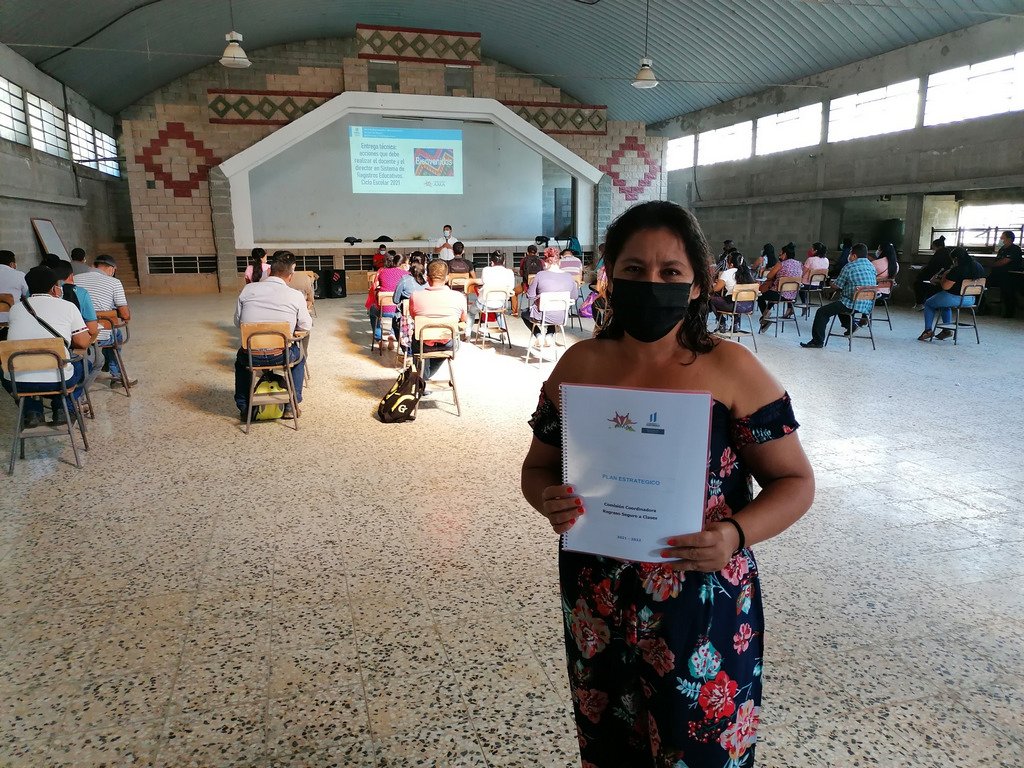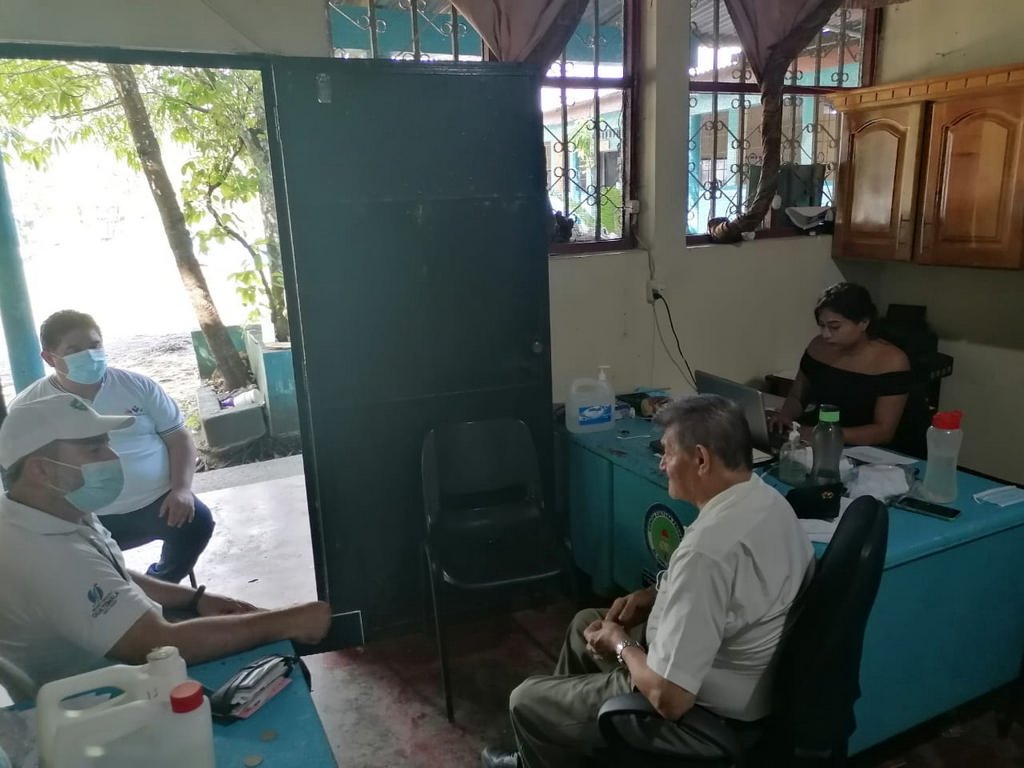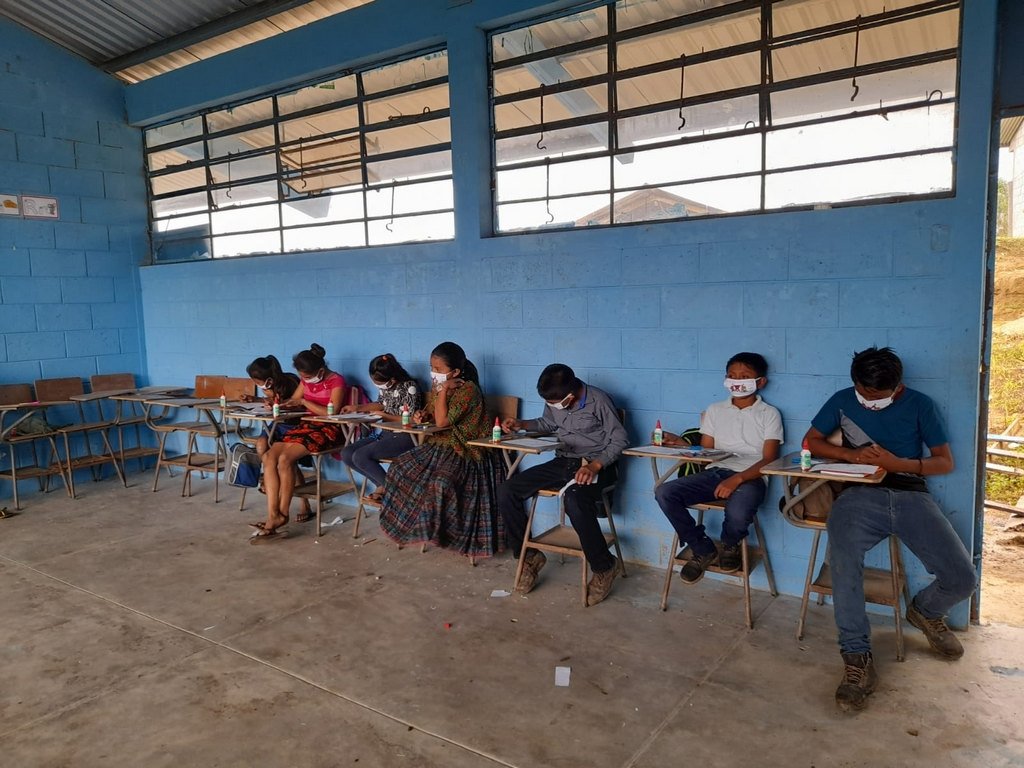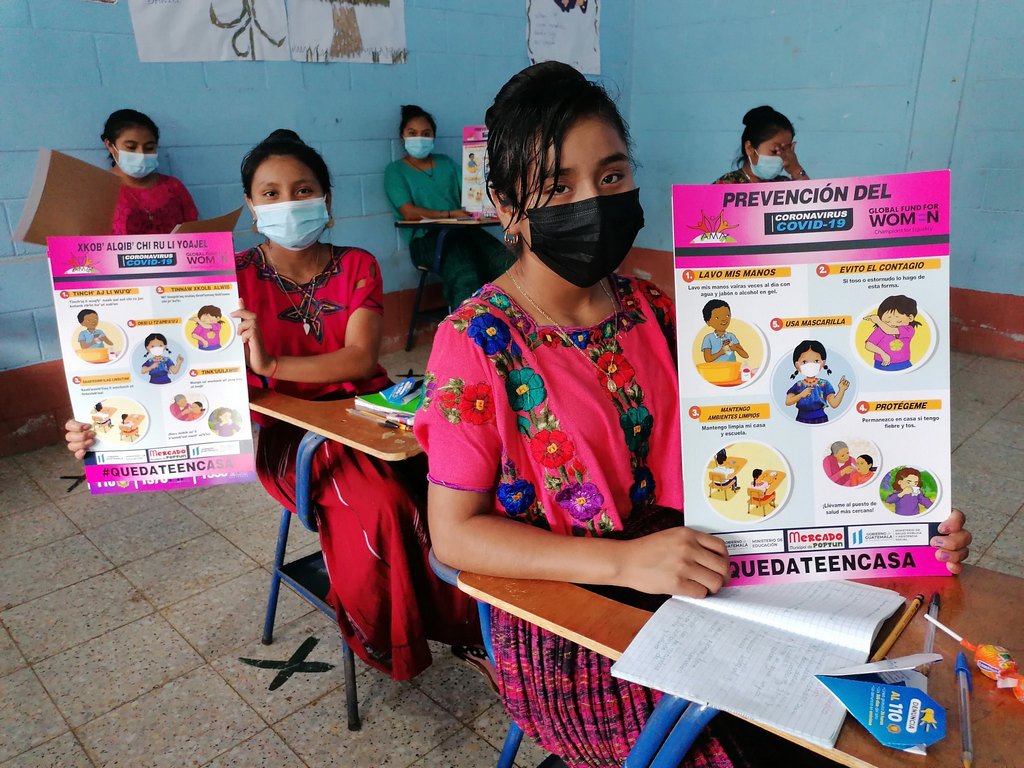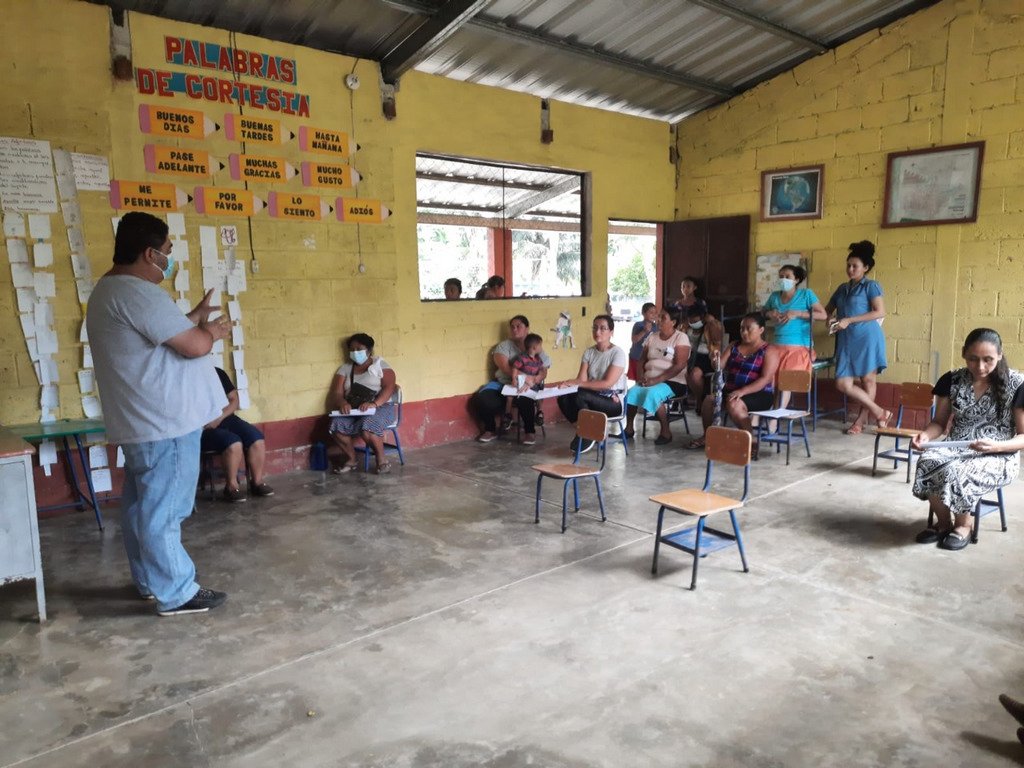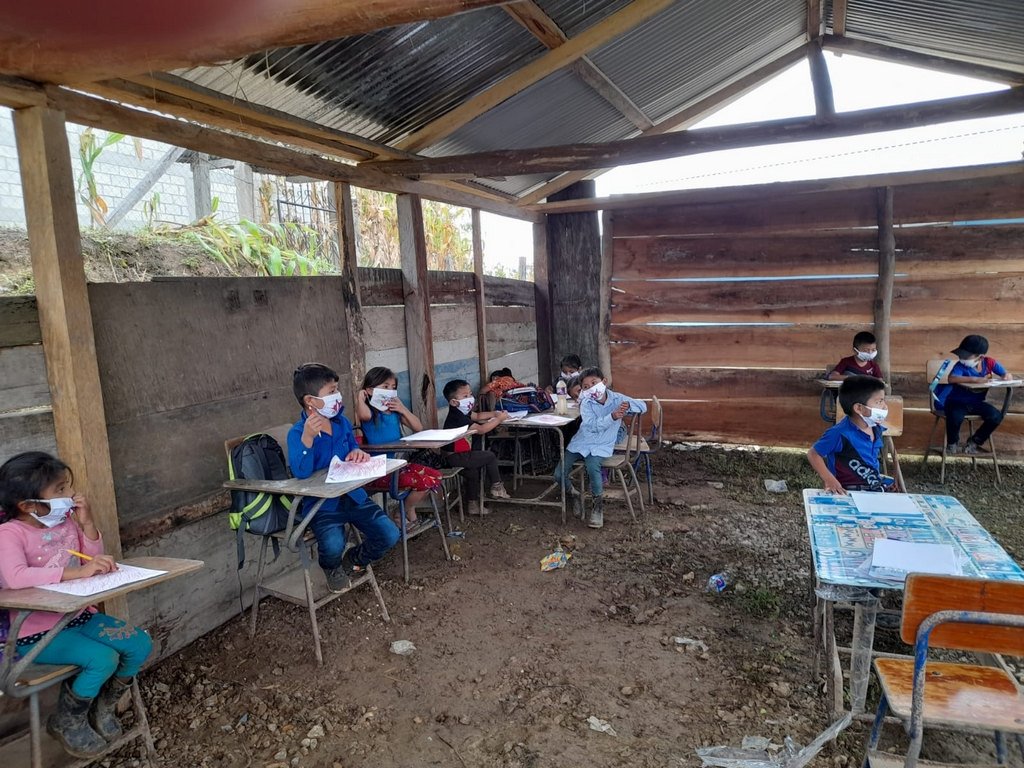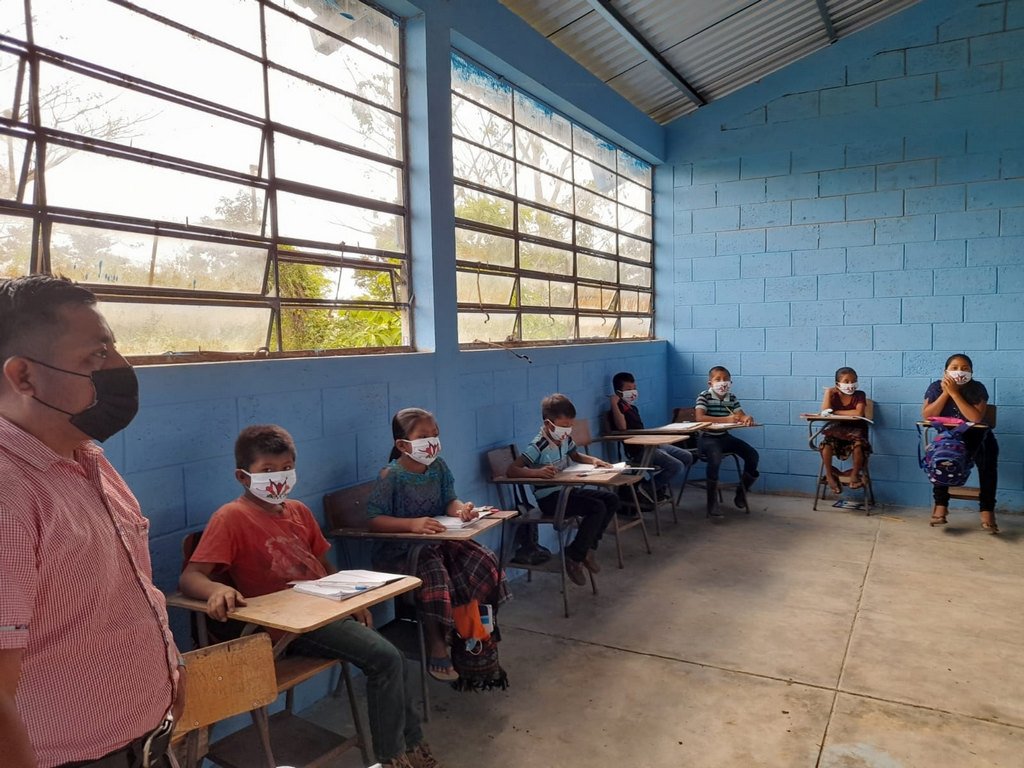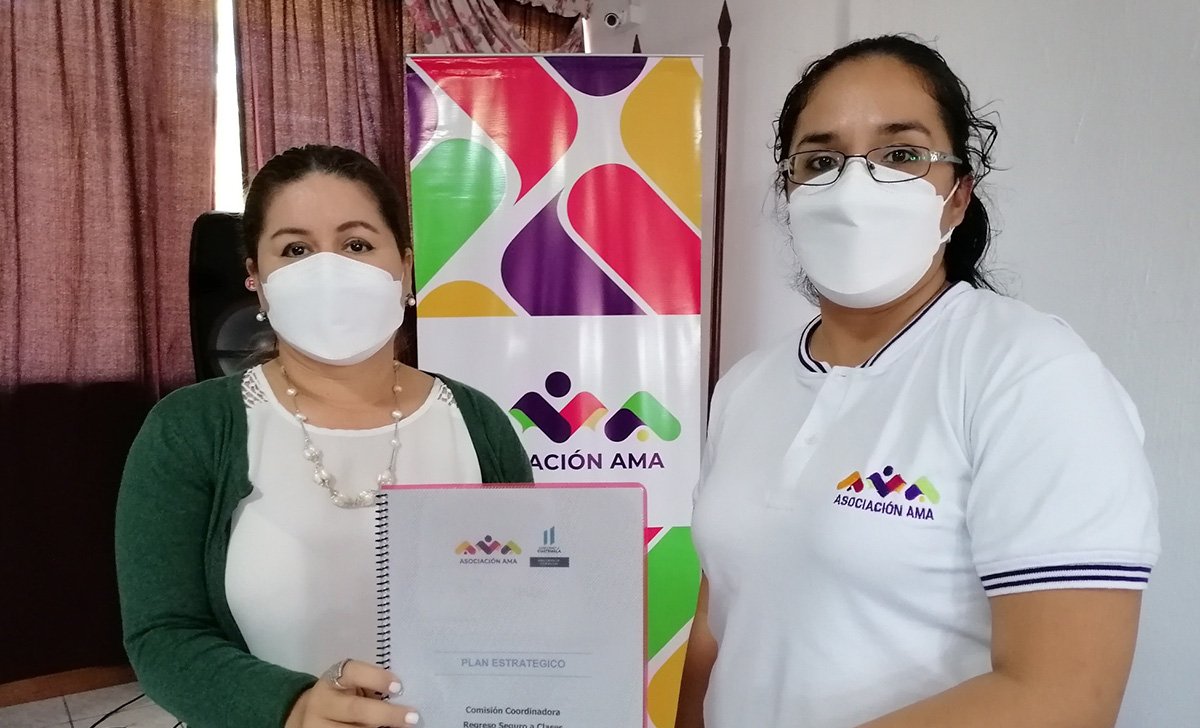
Project Name:
My dignified and safe return to school.
Start date: April/2021
End date: March/2022
1,200 girls benefited
The project "My Dignified and Safe Return to School" aimed to strengthen access to distance education, ensure a safe return to public primary schools, and prevent absenteeism and school dropout among 1,200 adolescent girls (AG) of Maya Q’eqchí’ and mixed descent in the South of Petén, Guatemala.
This strengthened the short-term response to the most significant immediate effects of the pandemic on education in Guatemala, particularly among the most vulnerable populations. This aligns with the purpose of the special initiative by the Tinker Foundation to ensure educational equity during the COVID-19 pandemic.
The project's objectives were aligned with the focus areas of the special initiative by strengthening the access to education for adolescent girls. This also enhanced the capacities of 120 teachers in implementing distance education.
The use of the radio to expand comprehensive sexuality education (CSE) and violence prevention (PV) also aligned with the objectives, as it aimed to provide adolescent girls with tools to prevent pregnancies, which is one of the causes of absenteeism and school dropout in the South of Petén.
Finally, the strategic plan of the Safe Return to Classes Commission allowed educational officials and teachers to improve consensus decision-making and unify criteria for the implementation of return to school protocols during the pandemic in 400 primary schools.
To achieve the project's objectives, the following activities were carried out:
Activities 2021-2022
The project "My Dignified and Safe Return to Classes" was presented virtually to the directors of education and health in Petén and Petén Sur Oriente, along with their teams. The presentation was conducted by the Administrative Director of the AMA Association, who is also the project coordinator.
The Director of Education expressed his support and emphasized the need to closely monitor the project, while the Director of Health highlighted its relevance in combating the pandemic and reducing COVID-19 infections in schools. He emphasized the role of education in disease prevention.
A meeting was scheduled to coordinate with the responsible officials from the education and health districts in order to form a coordinating committee for the return to classes and develop a strategic plan.
Two meetings were held in Poptún and San Luis for the presentation of the project and the delivery of COVID-19 biosecurity supplies to 20 selected schools. School principals, administrative coordinators, and pedagogical advisors from the school districts of both localities participated, representing the Departmental Directorate of Education of Petén.
The meetings aimed to raise awareness about the importance of the project and responsible return to classes, and commitments for its implementation were agreed upon. In addition, a deadline was set for registering teachers in virtual workshops on distance education, and a schedule for the workshops was established. The supplies delivered included digital infrared thermometers, hand sanitizer, disinfectant, and masks.
The participants expressed their gratitude and pointed out limitations for face-to-face and distance education, such as the lack of adequate infrastructure, limited access to water, and challenges in the methodological and operational implementation of distance education.
10 meetings of the coordinating commission for the return to classes in Southern Petén were held, where the strategic plan aimed at 400 schools was implemented and followed. 50 people participated, including representatives from the DIDEDUC of Petén, school and health districts, and the Ministry of Environment of Southern Petén, as well as the AMA team. The meetings were in-person, although some points were discussed remotely.
Due to the high rate of COVID-19 in the region, it was decided not to include the 12 selected adolescents in the commission in person, to avoid the risk of contagion. Their opinions and contributions were communicated through project techniques of AMA. The adolescents expressed a preference for face-to-face education, difficulties with distance education, and the desire to return to school, respecting biosecurity measures.
These perspectives significantly influenced the development of the strategic plan, which promoted the reopening of schools with appropriate biosecurity protocols. The plan included the formation of School Risk Management Committees and Municipal Committees in the 5 municipalities of Southern Petén.
The project had a positive impact on reducing the rate of dropout and absenteeism in the 20 priority schools, registering a rate of 2.82% according to the SIRE. Furthermore, it was observed that family migration to the United States significantly influenced school absenteeism, relating to changes in U.S. immigration policies and governmental changes.
30 out of the 24 workshops initially planned on the use of digital platforms for distance education were held, with 2 additional workshops added to improve effectiveness in teacher training. The topics included online facilitation, design of dynamic spaces, management of digital material, and use of platforms and social networks. The workshops, led by Spanish-Maya Q’eqchi’ bilingual facilitators from the AMA Association and professionals from DIDEDUC of Petén, aimed to strengthen the capabilities of 120 teachers from 20 primary schools in San Luis and Poptún.
The activity contributed to the goal of improving distance education for 1,200 students, initially facing resistance and unfamiliarity with digital tools among teachers, students, and parents. As the project progressed, distance education gained appreciation. However, the implementation of what was learned varied: 15% through Zoom, 20% via Jitsi Meet, 35% through WhatsApp, and 30% were unable to do it through digital means. Jitsi Meet and WhatsApp were highlighted for their lower cost.
The distance teaching-learning process gradually improved, but mathematics presented challenges, leading many schools to opt for strengthening this area in person by creating bubbles. In areas where distance education was complicated, it was decided to reopen schools with biosecurity protocols and divide students into bubbles, working 4 days a week.
The reopening of the schools involved assuming risks of COVID-19, but only 5% of the cases were registered in them. Outbreaks in the communities were more related to social activities. Finally, biosecurity supplies were delivered to 50 schools in various municipalities, prioritizing the smallest and poorest ones. This allowed 2,489 students to continue their studies. The distribution of government's free funds, based on the number of students, was not enough to cover the biosecurity supplies in the smallest schools, but the delivery of these supplies facilitated the opening of the schools.
30 episodes of the bilingual program "El ABC de la Sexualidad" were broadcasted on radio and Facebook Live, targeting 1,200 adolescents and their families in San Luis and Poptún, Petén, and reaching approximately 10,000 listeners in Southern Petén. The weekly one-hour programs focused on comprehensive sexuality education and violence prevention, with an emphasis on educational continuity and COVID-19 biosecurity norms. Three young bilingual broadcasters from AMA led the programs, reinforcing their skills through a radio broadcasting workshop.
The objective of the program was to increase access to information on sexual education and violence prevention for 1,200 adolescents, providing tools to prevent early pregnancies and motivate their school attendance. It is estimated that the program reached 1,200 adolescents and two members of their families, in addition to educating about 2,000 additional people in San Luis, Poptún, Dolores, El Chal, and Santa Ana. A significant audience was also recorded in other departments and neighboring countries.
The National Observatory of Reproductive Health (OSAR) reported a significant decrease in teenage pregnancies among 10 to 14-year-olds in Guatemala in 2021, with AMA contributing to a reduction of 61.34% in Petén and 63.12% in Southern Petén. In teenagers aged 15 to 19, AMA's contribution was a decrease of 1.08% in Petén and 11.82% in Southern Petén. This achievement is attributed to the influence of the project during the pandemic, although the possibility of an inaccurate registration of pregnancies in 2021 due to the pandemic is acknowledged.
Six interactive dialogue circles were organized with 60 adolescents from 6 of the 20 schools prioritized in the project. These circles focused on topics such as the importance of returning to classes, compliance with COVID-19 biosecurity protocols, the adolescents' opinions on school functioning during the pandemic, and access to comprehensive sexuality education.
The circles were held in different locations in San Luis and Poptún, Petén, with the participation of 10 adolescents per group. Two young Maya Q’eqchi’ and mestizo women from AMA facilitated these sessions using highly participatory methods, including games and dynamics to foster trust and safe expression of opinions.
The dialogues revealed that the pandemic affected the students both academically and emotionally. The participants expressed a preference for face-to-face classes, feeling that they learned more and felt better than with distance education. Attending school offered them the opportunity to interact with teachers and peers, which strengthened their self-esteem and motivation to study.
During this activity, the following was also found in the participants:
- The girls reflect sadness due to having limited access to schools, food, and poverty situations, as they have access to school meals at school. Escape from the violence they experience.
- Parents handed in assignments and received workbooks once a week, tasks through WhatsApp and Zoom. As a result, the girls had limited contact with their teachers. In rural areas, girls attended school two to four times a week. In urban areas, many girls receive distance education with borrowed phones, while in rural areas, they have minimal access to technology but more access to radio. Internet access is through top-ups. Distance education is not the same; doubts are not clarified. There are difficulties with connection, poor signal, and one device shared among several people. Only twice a week are there online classes, and at most 1 hour per day. They feel better with face-to-face classes. They miss seeing and playing with their friends, teachers, physical contact, food. When returning to classes, the girls expressed discomfort with wearing masks, but would do so if necessary.
10 meetings were held for the socialization of the strategic plan for the return to classes in Southern Petén, with the participation of 400 directors of primary schools from San Luis, Poptún, Dolores, El Chal, and Santa Ana. The meetings were conducted in a hybrid format to discuss the plan and clarify doubts, reducing the risk of COVID-19 contagion.
The directors acknowledged that, although the plan was solid and better organized the protocols, they faced economic, digital, and educational challenges in implementing the biosecurity protocols. They also mentioned difficulties in coordinating with public health and in developing training for risk management committees.
In response, the AMA Association proposed to DIDEDUC to seek more support for the schools and for the district coordinators to present a diagnosis of the schools to the Municipal Development Councils to manage resources. As of the time of the report, DIDEDUC planned to include more funds for schools in its Annual Operational Plan, subject to government approval. The request for resources from local governments was suspended in 2021 due to the end-of-year labor and fiscal closure.
The implementation of the strategic plan has benefited 30,799 students from the 400 schools in the region, strengthening the process of a safe return to classes in Southern Petén.
60 monitoring visits were conducted in primary schools in Southern Petén to verify and strengthen the return to classes and COVID-19 biosecurity protocols. These monitors were carried out by municipal committees composed of district school coordinators, environmental sanitation inspectors from health districts, and the AMA Association.
The monitoring revealed that in marginalized urban and rural areas where distance education is challenging, the educational community opted for in-person teaching. Rural schools and some marginalized urban schools partially reopened, operating four days a week and organizing students into bubbles. Students attended school two days a week, and for the rest of the time, they continued their learning through guides and assignments.
In public schools that implemented hybrid education, students received two hours of distance education per week, supplemented with guides and assignments. This semi-presential approach was maintained even when the epidemiological traffic light was in red, indicating a high risk of contagion.
150 field monitoring visits were conducted in the homes of 1,200 prioritized adolescents in the project, coinciding with the broadcast of 30 radio programs in the communities of San Luis and Poptún. For this purpose, 5 teams of 2 people were formed, visiting 25% of the households during each program.
During the visits, it was found that 85% of the adolescents listened to the program through a radio transmitter, 5% through Facebook Live, while the rest were not connected at that time. On average, two members of each family, usually mothers and siblings, also listened to the program. Additionally, it was observed that friends and neighbors of the visited girls joined in listening to the program in 50% of the households.
The adolescents felt connected and excited when they heard the name of their school mentioned in the program. Mothers appreciated the sexual education provided by the program, recognizing that they did not have access to essential information during their adolescence. They highlighted the importance of this knowledge in preventing pregnancies and sexual violence and in helping their daughters stay in school and fulfill their life plans.
Almost 50% of the girls expressed a preference for morning broadcasts. Therefore, 15 programs were aired on Fridays from 14:00 to 15:00 hours (as initially scheduled), and the other 15 were broadcast on Saturdays from 9:00 to 10:00 hours.
Furthermore, the following activities were carried out:
- Meeting to socialize the Strategic Plan for the return to classes in Southern Petén 2021-2022 with members of the departmental Technical Table for Prevention with Education of Petén.
- Intensive course on audio management, production, and editing, aimed at the broadcasters of the bilingual radio program "El ABC de la Sexualidad" from the AMA Association.
- Purchase of office and audiovisual equipment (projector, screen, conference table, webcam, refrigerator).
- Additionally, more biosecurity supplies were purchased to be delivered to other schools that were not initially included in the proposal (thermometers, disinfectant).
It is worth mentioning that these activities were authorized by the Tinker Foundation and, above all, greatly strengthened the implementation of the project and the operational capacities of the AMA Association.
Results Achieved 2019-2021
- Meetings of the Coordinating Commission for the Return to Classes in Southern Petén.
50 representatives, including Maya Q’eqchi and mestizo members of DIDEDUC from Petén and School Districts, the South Petén Health Area, and Health Districts. Additionally, an educator from the Ministry of Environment of Southern Petén participated. - Virtual workshops on the use of digital platforms for dynamic implementation of distance education.
120 Maya Q’eqchi and mestizo teachers from 20 primary schools in Maya Q’eqchi’ and mestizo communities and marginalized urban areas in San Luis and Poptún, prioritized in the National Plan for Pregnancy Prevention (PLANEA). - Broadcasts of the bilingual Spanish-Maya Q’eqchi’ radio program "El ABC de la Sexualidad."
1,200 adolescent girls and their Maya Q’eqchi and mestizo families from the prioritized communities in the project. - Interactive dialogue circles.
60 adolescent girls, including Maya Q’eqchi and mestizo, from the hamlets of La Cumbre and La Tortuga, San Luis, and from the neighborhoods of El Porvenir, Santa María, Las Joyas, and El Reformador, Poptún, Petén. - Meetings to socialize the strategic plan of the commission with primary school directors.
400 directors, including Maya Q’eqchi and mestizo, from the 400 public primary schools in the 5 municipalities of Southern Petén: San Luis, Poptún, Dolores, El Chal, and Santa Ana. - Meeting to socialize the Strategic Plan for the return to classes in Southern Petén 2021-2022 with members of the departmental Technical Table for Prevention with Education of Petén.
40 officials, including Maya Q’eqchi and mestizo, from the Departmental Directorate of Education (DIDEDUC) of Petén, and the three Health Area Directorates of Petén (South East, North, and South West).
- Intensive course on audio management, production, and editing, aimed at the broadcasters of the bilingual radio program "El ABC de la Sexualidad" from the AMA Association.
Six female broadcasters, including Maya Q’eqchi’ and mestizo, from the AMA Association.
- 30,799 girls and boys, students from the 400 primary schools in the municipalities of San Luis, Poptún, Dolores, El Chal, and Santa Ana, Petén, according to the Educational Records System (SIRE).
- 10,000 listeners of Radio Shekina in Southern Petén who received information from the broadcasts of "El ABC de la Sexualidad."
- 1,200 adolescent girls and their Maya Q’eqchi and mestizo families from the prioritized communities in the project.
- 60 adolescent girls, including Maya Q’eqchi and mestizo, from the hamlets of La Cumbre and La Tortuga, San Luis, and from the neighborhoods of El Porvenir, Santa María, Las Joyas, and El Reformador, Poptún, Petén.
Based on publicly available data recorded by the National Observatory of Reproductive Health (OSAR), we can say that the project has contributed to a 55.87% reduction in pregnancies in adolescent girls aged 10 to 14 years in Guatemala in the year 2021.
This is due to the fact that, according to the National Observatory of Sexual and Reproductive Health (OSAR), there were 4,814 pregnancies in adolescent girls aged 10 to 14 years in Guatemala in the year 2020, and in the year 2021, there were 2,124 pregnancies in the same age group nationwide.
In the department of Petén, OSAR reports that in the year 2020, there were 489 pregnancies in adolescent girls aged 10 to 14 years, and in the year 2021, there were 189 pregnancies in the same age group. Therefore, AMA contributed to a 61.34% reduction in the rate of early pregnancies in Petén.
In the Southern Petén region, for the year 2020, OSAR registered 141 pregnancies in adolescent girls aged 10 to 14 years. For the year 2021, in the same age group, OSAR registered 52 pregnancies in adolescent girls in this specific area of the department. Therefore, AMA contributed to a 63.12% reduction in pregnancies in adolescent girls aged 10 to 14 years in Southern Petén. This demonstrates that Southern Petén leads in the prevention of pregnancies in the department of Petén. Southern Petén includes the municipalities of San Luis, Poptún, Dolores, El Chal, and Santa Ana.
In the case of the age range of adolescent girls aged 15 to 19 years, there was a contribution to a 2.54% reduction in pregnancies in adolescent girls aged 15 to 19 years in Guatemala. According to the National Observatory of Sexual and Reproductive Health (OSAR), there were 100,023 pregnancies in adolescent girls aged 15 to 19 years in the year 2020, and for the year 2021, there were 97,478 pregnancies in the same age group nationwide.
In the department of Petén, according to OSAR, there were 6,461 pregnancies in adolescent girls aged 15 to 19 years in the year 2020, and in the year 2021, there were 6,391 pregnancies in the same age group. This means that AMA contributed to a 1.08% reduction in early pregnancies in Petén.
In the case of the South of Petén, the efforts of the AMA Association have contributed to a reduction of 11.82% in pregnancies in adolescent girls aged 15 to 19 years. In the year 2020, OSAR registered 2,064 pregnancies in that age range, and in the year 2021, there were 1,820 pregnancies.
Indeed, one of the main achievements of the AMA Association during the project period has been its contribution to the reduction of teenage pregnancies during a time of pandemic. This has strengthened access to education for adolescent girls.
It's important to recognize that there may be circumstances that have affected the healthcare system's ability to accurately record pregnancies in 2021 due to the pandemic, a situation that has yet to be determined.
COVID-19 has intensified the risks and inequalities faced by adolescent girls (AG) in Guatemala. Among the most significant challenges is the decline in the learning curve caused by the closure of public schools, which exposes them to even more adverse situations, particularly AG from indigenous communities, rural areas, and marginalized urban areas.
During the year 2020, the Guatemalan government was unable to effectively implement distance education, and it currently lacks the capacity to ensure a safe return to classes. For these reasons, significant absenteeism is expected in 2021, especially among indigenous AG who, due to misinformation, low educational levels, or poverty, stay at home doing domestic chores or are even married off by their parents.
Not going to school also means a lack of access to comprehensive sexuality education (CSE) for AG, which increases the chances of them becoming pregnant and dropping out of school. In fact, within the context of the pandemic in 2020, there was an increase in sexual violence (SV) and early pregnancies among AG across the country.
Finally, there is a fear that a return to classes that does not take into account minimum biosecurity measures could lead to AG and teachers getting infected and could result in a new escalation of COVID-19 in Guatemala. This could increase absenteeism and dropout rates in schools and may even lead to the closure of schools once again.
The donor who funded this project




